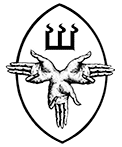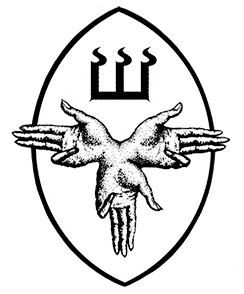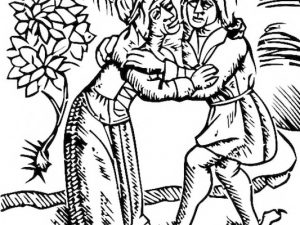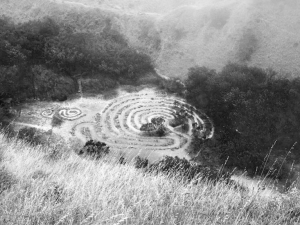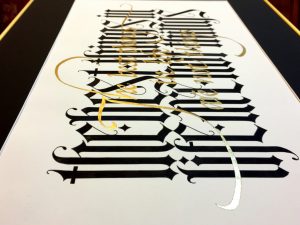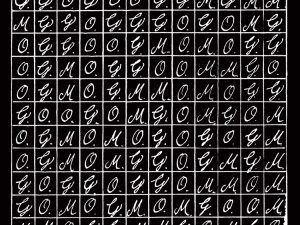
Atropa, I bend my song to you.
An argument emerged among the philosophers, over Fate, said to be beyond even the power of Zeus to alter, and Tyche, Chance, later embodied as Fortuna. At issue was the matter of Free Will.
Atropos is the one who cuts the thread
An argument developed. Athanasius maintained that one should worship the Creator, not the Creation. A contrary view was that the true way to honor the Creator was by honoring His Creations.
The Rational Cosmos, educated and enlightened, or, that lacking, accepted by Faith, was championed as a bulwark against superstition and all the mumbo-jumbo and chanted spells of the ignorant. To that end, spells were chanted and the catechism recited.
Then there were those who felt that Nature transcended mere theory, that each creature, plant, and mineral had an essence, a spirit, endowed therein Divinely. Thus Bruno concluded that some magic was good magic. For this he was burned.
Some said This World is the Devil’s, and therefore bad, and the things of God wholly Other. Therefore the Wild was the Devil’s World.
The Rational part was the Garden, enclosed and controlled. Out past the hedgerows was the untamed dark forest. The Wild was an untidy place, where demons lived— like the Land of Dreams, where one did those things which were forbidden.
The unlettered masses, as they always do when marginalized and impoverished, turned their frustrations on themselves. Villagers accused each other of witchcraft. Not that the Church didn’t have a hand in it—they often did—but generally the Inquisition was more interested in the Brunos and the Galileos and rich Jews with property. Mostly, we accused each other. And we probably jeered and shouted as we were taken to the stake.
Some thought dreams had meaning. Some thought the gist and flow of the future tide could be sampled—that there were marks and signs in the present that foretold what would be. Some still think this. Some thought that, since God determined all things, to divine the Divine Intention was at the least immodest, at worst, Satanic.
Some thought that denigrating a Symbol was itself a high crime, but it’s not clear if that is Rational. Some thought that speaking the name of a False God was a crime.
Some believed in Reason. Some, reasonably, believed in Signs. Some believed in some Signs but not others. Some thought it a crime to desecrate the Flag or to possess an Idol. One’s personal library can still be used as evidence in court.
He owned a lot of books on drugs.
Some must have known that they lived in a dark time, and that it was the imprisonments and the burnings that were the crimes. Some knew but were hard-minded, that for the Greater Good, well, things must be done. Some still believe this.
During the Reformation and the Counter-Reformation everything got worse. Wars devastated the country. The leaders felt that matters of great importance were at stake and that extraordinary measures were justified.
It is written.
If there were pagan beliefs and practices in the countryside, they had nothing to do with the Classical Paganism of the Neoplatonists, with Roman gods or Mediterranean fertility cults. Whatever had survived in folk culture was surely indigenous.
The pharmacological properties of belladonna were well known to educated physicians. And from a handful of cases, we know that commoners experimented with them also. Greasing a broomstick with a belladonna flying ointment, and applying it between the legs would surely be effective—all the tropane alkaloids are readily absorbed transdermally. Beyond that the story gets more dreamlike. In one case a monk sat with a woman who claimed that she flew with the Devil after applying the unguent, in order to assure her that it was all a delusion and that she had never left the room. Others seemed to think that if one believed one were flying with the Devil, that was devilish enough. Most of the witchcraft trials, however, had nothing to do with psychotropic plants—the accusations, like they are everywhere in the world where such things occur, had to do with things like the evil eye or envy, with pettiness. Arthur Miller seems to have caught it close to the mark.
Some think the dark side of magical thought is a greater threat than Dead Reason. Some think Reason is an intriguing idea and ought to be tried, sometime.
According to Inquisitional guidelines, as outlined by Schulke, herbal knowledge itself could be an indicium of witchcraft. Merely gathering wild plants was suspicious enough for one to be placed on a watch list, or for one to be questioned. Sort of like today, when governmental agents may watch your mail for months, or even years, and arrest you if there are toadstools in any of your packages. A law being proposed in Louisiana would make possession of all of the plants mentioned in this book a felony.
Some think Reason should be given a chance. Some think it reasonable to try to see what lies beyond Reason. Some think it is more important to stamp out Evil.
Some think there is only One God, others think there are Three. Some think there is One but that it is Everything. Some think there is No God, others think there may be gobs of them. Some think that “love your enemies” ought to extend to unbelievers. It may be important, somehow, that at least one person in the world believes this.
From Pharmako/Gnosis (2005, Mercury House)
